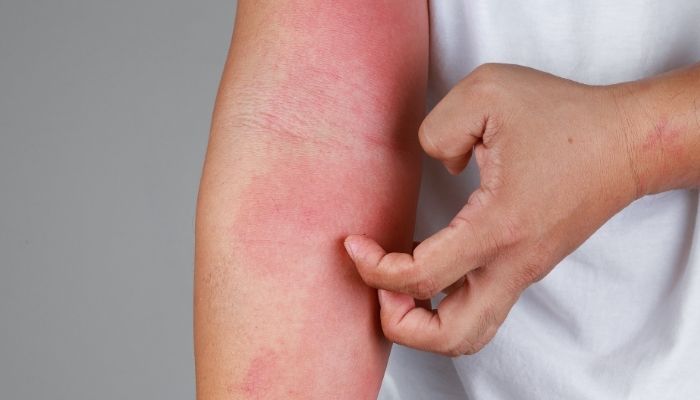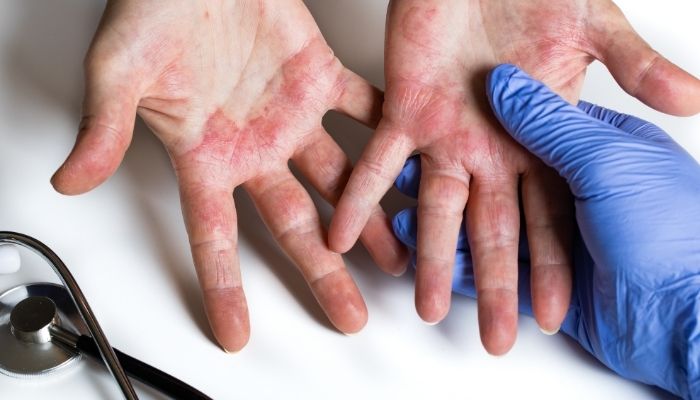Atopic dermatitis, commonly known as Eczema is a condition in which the outer layer of the skin starts to appear patchy and inflamed. It is usually coupled with itching in the affected area.
Researchers are unable to pinpoint the exact cause of atopic dermatitis, however, popular theories state that it may be caused due to cells overproducing in the immune system, which in turn results in inflammation.
Proper atopic dermatitis medication and treatment with a practiced professional can help patients reduce the atopic dermatitis symptoms to a large extent. The skin becomes scaly and starts to peel, revealing new and healthy skin underneath.
The first signs of atopic dermatitis usually appear in childhood days and prolong through the teenage years, and manifest greatly in adulthood. Patients tend to scratch the affected area subconsciously, which then leads to scabbing of the skin. Gradually, the layers of the epidermis start to harden and thicken.
There are no cures for atopic dermatitis to get rid of the problem permanently. However, there are atopic dermatitis treatment methods that ease the discomfort and help peel off the scaly skin to reveal a better quality of the skin.
Atopic dermatitis can be classified under categories much like conditions of asthma, food allergies, and hay fever. There are 6 distinct types of atopic dermatitis based on the areas it affects. The atopic dermatitis treatment plans will target the drugs that work best on the affected areas.
What Are The Causes Of Atopic Dermatitis?
As we have mentioned, researchers are still trying to pinpoint the actual cause of atopic dermatitis. One thing that is determined is that the condition is not contagious therefore you cannot contract it through contact with someone who has atopic dermatitis.Most of the atopic dermatitis symptoms are caused by inflammation in the cells. If a person has Eczema, they are reported to also have misdirected reactions from the immune system. This instigates a chain reaction wherein the body overdrives the production of cells, thus leading to swelling, tenderness, and irritation on the skin.
Another observation of people with atopic dermatitis showed that they tend to have higher tendencies to lose water content from the body. Their skin is also prone to attacks from irritants, thus resulting in itchy skin and irritation.
Even though the exact causes of atopic dermatitis are yet to be ascertained, there are triggers that instigate the condition that you can avoid. They are as follows:
- Heat
- Sweat
- Scratching
- Stress
- Cold weather
- Dry weather
- Long periods spent in hot showers or baths
- Certain soaps, cleaners, and even detergents
- Synthetic fabrics
- Woolen fabrics
- Strenuous exercises
- Allergens such as pollen, dander, dust, etc.
- Irritants that physically bother the skin such as smoke, sand, dirt, etc.
What Are Atopic Dermatitis Symptoms?
While there are primary atopic dermatitis symptoms that will help you recognize a potential problem, there are more defined symptoms that help dermatologists determine the best atopic dermatitis medications that may work for you.The common atopic dermatitis symptoms are:
- Itchiness on the skin
- Redness in the affected areas
- Dry skin in certain affected areas of the skin
- Skin hardening
- Unexplained bruising on the skin
Defined atopic dermatitis symptoms differ in different age groups. Here are the symptoms of atopic dermatitis in infants:
- Rashes on the cheek or the scalp of the head.
- Dry skin
- Itchy and scaly skin
- Rashes form bubbles and accumulate clear fluids.
- Formation of scaly and extremely dry skin
- Rashes form in the creases of knees, elbows, etc.
- Skin spots that are light or dark-coloured.
- Rashes on the face and neck area
- Rashes around the eyes
- Scaly patches of skin around particular rashes
- Skin hardening like leather
- Scaly and dry skin, especially in knees and elbows
- Itchy skin behind the neck and on the face
- Rashes around the eyes
- If they had atopic dermatitis as a child, they are likely to develop thick skin like leather.
It is important to keep up with an ongoing atopic dermatitis treatment, preferably one with oral or topical atopic dermatitis medication.
What Are Atopic Dermatitis Treatments?
As we have discussed, there are no known cures for atopic dermatitis since the root cause of the condition is unknown. Still, there are certain atopic dermatitis medications that the patient can consume or apply to the affected area in order to get rid of the itchiness or dull the discomfort at least.There are several supplements that people in need of atopic dermatitis treatment can take. These supplements help improve the condition of the skin and inspire better, smoother skin on the affected areas.
In some cases of atopic dermatitis treatment, doctors can prescribe topical ointments that can be obtained over the counter to address the dry, scaly skin condition. There are also targeted skincare products that the person suffering from eczema can use.
Prescription medications for atopic dermatitis treatment have a higher chance of yielding more effective results simply because the atopic dermatitis medications are targeted for each affected area of the skin. The biggest challenge for people is to fight the impulse to scratch the skin. A topical ointment with a numbing agent can do wonders to subdue the itchiness and allow the skin to heal naturally without scabbing.




